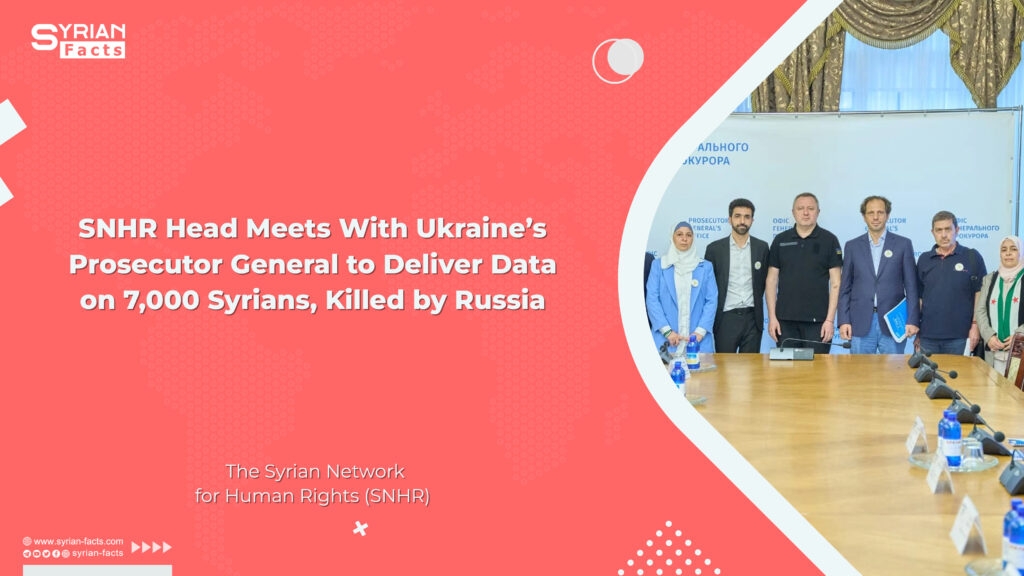Fadel Abdul Ghany, the Executive Director of the Syrian Network for Human Rights (SNHR), recently met with the Ukrainian Prosecutor General, delivering a list containing data on approximately 7,000 Syrian citizens, including approximately 2,000 children, who were killed by Russian forces in Syria since the beginning of Russia’s unlawful military intervention in the country in September 2015. The data includes the victims’ names, as well as the locations and dates of the killings, along with other relevant details. The meeting took place at the Ukrainian Prosecutor General’s office in the Ukrainian capital, Kyiv. During the meeting, Mr. Abdul Ghany also submitted the most recent report released by SNHR on the violations by Russian forces in Syria, including figures on victims, vital facilities, massacres, Russia’s use of cluster munitions and incendiary weapons, and other violations committed by Russian forces since September 2015.
Since the beginning of the Russian military intervention in Syria, SNHR has worked on monitoring and documenting the violations committed by Russian forces, including killing, destruction, forced displacement, and targeting vital facilities, with all these violations, which continue to date, being archived in a specially designated database. In the years since the intervention began in September 2015, we have published numerous news reports on these crimes, as well as issuing 94 reports to date shedding light on multiple types of violations committed by Russian forces, which can be found here.
Ukraine’s Prosecutor General and his deputy have both shown great interest in SNHR’s work, with the two sides confirming that the recent meeting will lead to further coordination and collaboration, and more sharing of detailed data and information on specific attacks by Russian forces in Syria. According to our database, Russian forces have perpetrated or been involved in multiple violations that qualify as war crimes by bombing approximately 223 schools, 207 medical facilities, and 60 markets.
A key objective of this coordination and collaboration between SNHR and the Ukrainian Prosecutor General’s office is to confirm the existence of a pattern in Russia’s violations in both Syria and Ukraine. A part of this is proving that some of the same Russian leadership figures have been involved in ordering and supervising unlawful attacks in both countries. Moreover, these collaborative efforts involve exchanging expertise between the two sides. It is important, however, to note, in order to put things in perspective, that we do not believe that this collaboration will ultimately lead to building a criminal case against Russia in Syria. Despite this, however, this coordination remains a valuable technical alliance which sends an important political message to all the world’s states, emphasizing that accountability should be universal and holistic, and that the Russian regime has been involved in violations of international law ever since its invasion of Georgia in 2008, and then Crimea in 2014, Syria in 2015, and finally Ukraine in 2022. There is today a fairly prevalent belief that some Western countries’ lenient attitude to Russia betrays an implicit desire to induce Russia to involve itself in more countries and regions, thereby draining its financial and military capabilities.
This meeting between the SNHR founder and the Ukrainian Prosecutor-General was the fruit of efforts by a number of Syrian civil society organizations as part of a wider visit to Ukraine. SNHR underscores the importance of networking and cooperation among Syrian civil society organizations, and between Syrian and Ukrainian civil society organizations. In this context, SNHR was a co-founder of the Syrian-Ukrainian network that aims to deliver the voice of victims in Syria and to stand in solidarity with the victims in Ukraine.





Be the first to write a comment.